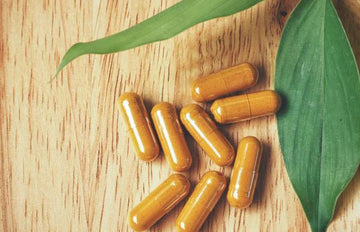All of our encapsulated supplements are found in capsules made from vegetable cellulose - hydroxypropylmethylcellulose (HPMC). In this article we will present in more detail why we use HPMC capsules and what are their advantages compared to softgel capsules.
Article at a glanc:
- What does HPMC mean?
- Why do we use HPMC capsules at Trime?
- The benefits of our HPMC capsules
- Softgel capsules
- The issue of glycerol contamination
- Other uses of HPMC
- Conclusion
What does HPMC mean?
HPMC stands for hydroxypropylmethylcellulose, also known as hypromellose, which is a polymer of cellulose. Cellulose (from Latin cellula = cell) is a water-insoluble polysaccharide that forms part of plant cell walls. Cellulose has a fibrous structure, is part of fiber and also has health benefits. 2 health claims are approved for HPMC: consumption of hydroxypropylmethylcellulose with food helps to limit the rise in blood glucose levels after that meal and consumption of hydroxypropylmethylcellulose helps to maintain normal blood cholesterol levels.
Why do we use HPMC capsules at Trime?
In dietary supplements, HPMC is mainly used for the production of capsules. Their advantage is that they allow the production of supplements without additional additives. The HPMC capsule can be filled with only the active substance and thus minimize the use of other unwanted ingredients.
A very important role of the capsule is to protect its contents from degradation and unwanted changes. HPMC capsules protect their content against fluctuations in temperature or humidity and guarantee the stability of the product.
The capsules are tasteless and odorless and suitable for vegetarians and vegans. Given the choice, most people do not want to swallow capsules made from boiled animal bones and skins. HPMC capsules are becoming more popular with customers.
The benefits of our HPMC capsules
- do not contain any allergens or preservatives
- maintain stability - withstand higher temperatures and protect the content of the capsule
- made from vegetable cellulose, suitable for people who do not consume animal products (vegetarians or vegans)
- produced from a purely plant source, natural alternative for supplying supplements to our body
- sustainable source of input materials
Softgel capsules
Softgel capsules are gelatin capsules made from gelatin or collagen from animal bones or skin. Gelatin is then combined with glycerol, water and possibly other additives. Their production is not so expensive and they represent a cheaper alternative of lower quality.
Softgel capsules do not guarantee the stability of the contents as HPMC capsules. Their content is more prone to degradation. In particular, substances sensitive to moisture may not remain stable due to the higher water content in the gelatin outer shell.
Glycerol is added to gelatin capsules as a plasticizer and at the same time as a hygroscopic substance capable of absorbing and retaining moisture. Glycerol belongs to permitted additives and is considered safe. However, as with other substances, it depends on its origin, processing and overall quality. The problem with glycerol can be its possible contamination with toxic substances.
The issue of glycerol contamination
The European Commission for Food Additives and Flavorings (FAF) evaluates the safety of chemical substances added to food and the exposure of consumers to these substances. In 2017 FAF re-evaluated the safety of the use of glycerol (E422).
As undesirable toxic substances could be formed during the production of glycerol, FAF made some recommendations that should be included in the glycerol specification. For example, FAF recommended to include a limit for acrolein (a toxic substance that irritates the eyes, mucous membranes, skin or respiratory tract) or revise the maximum limits for arsenic, lead, mercury and cadmium to ensure that glycerol as a food additive is not a significant source of exposure to these toxic elements.
Disadvantages of softgel capsules
- contain glycerol, colorants or other additives
- their content is more susceptible to degradation
- not suitable for vegetarians or vegans
Other uses of HPMC
HPMC is also used as an emulsifier, stabilizer or thickener. In the pharmaceutical industry hypromellose is added to eye drops to moisturize dry eyes. That is why it is sometimes called artificial tears.
Conclusion
The majority of educated customers who are interested in the quality and purity of the supplements will prefer supplements in natural capsules without unnecessary additives. If the supplement contains any additives, we recommend paying attention to their origin and purity as well. Alternatively, choose a manufacturer that is interested not only in nutritional benefits, but also in the overall quality and safety of all ingredients used. All individual ingredients ultimately determine the final quality and effectiveness of the supplement.

















